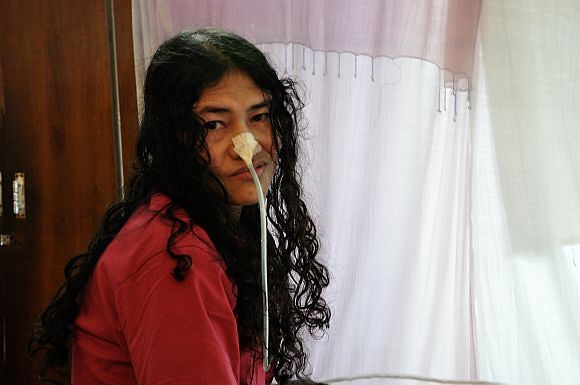Entry tags:
Irom Sharmila in court again
On June 4, Irom Sharmila will be in court in Delhi, which is to say, she'll be in a court that can capture the national eye (not so true of her appearances in court in Imphal, in the northeastern state of Manipur). The charge against her (attempted suicide, because of her hunger strike) is spurious, and worse, has the pernicious effect of distracting attention from her intention, which is to protest an unjust law--the Armed Forces Special Protection Act. People can be tempted to focus on getting her released, and yet, if she were just straight-up released, she'd very quickly die. The only way to truly save her is to work for the repeal of the AFSPA.

(image source)
Unfortunately, even in Manipur itself, there are those who benefit from the status quo. One journalist who has reported extensively on Manipur and AFSPA writes, "The political leadership, bureaucracy, Army and the insurgent groups all benefit from its biggest industry, AFSPA, and thus perpetuate its continuance" (Source).
How can things change? I don't know. But if it's so hard for the government in Delhi, the government in Manipur, and the army to disintangle from this law, then . . . maybe could the law be hollowed out from within? Could members of the armed forces be asked to make pledges to never violate civilian rights, and could there be rewards for honoring those pledges? Could development funds be tied to policies of inclusivity that assured that economic benefits extended to all ethnic groups and even to former insurgents? How do ordinary citizens in Manipur want things to go? What problems of daily life are most important to them? I cast about for ideas, but I'm not well informed about all the nuances of the situation on the ground, and it's not for me to suggest or conclude anything. I can only watch from the sidelines, biting my nails, and hoping.

(image source)
Unfortunately, even in Manipur itself, there are those who benefit from the status quo. One journalist who has reported extensively on Manipur and AFSPA writes, "The political leadership, bureaucracy, Army and the insurgent groups all benefit from its biggest industry, AFSPA, and thus perpetuate its continuance" (Source).
How can things change? I don't know. But if it's so hard for the government in Delhi, the government in Manipur, and the army to disintangle from this law, then . . . maybe could the law be hollowed out from within? Could members of the armed forces be asked to make pledges to never violate civilian rights, and could there be rewards for honoring those pledges? Could development funds be tied to policies of inclusivity that assured that economic benefits extended to all ethnic groups and even to former insurgents? How do ordinary citizens in Manipur want things to go? What problems of daily life are most important to them? I cast about for ideas, but I'm not well informed about all the nuances of the situation on the ground, and it's not for me to suggest or conclude anything. I can only watch from the sidelines, biting my nails, and hoping.
no subject
(I've also just been looking at this 2013 article. (http://www.thehindu.com/opinion/op-ed/afspa-who-rules-india/article4407851.ece) It seems there is considerable political will for repeal, but it's opposed by the military.)
Meanwhile, like you, all I can do is try to get better informed, watch on the sidelines,and try as hard as I can to offer personal moral support to Irom Sharmila - whose name will I hope ring this week across India as people realise more and more how much she stands for the absolute best in Indian culture, history and civil tradition.
no subject
I don't know anything really about the Tripura situation, other than the fact of AFSPA being lifted. I noticed that one Twitter person commented that "lifted" is not the same as "repealed." The law is no longer being applied there--but it still exists and could be reinstituted.
no subject
no subject